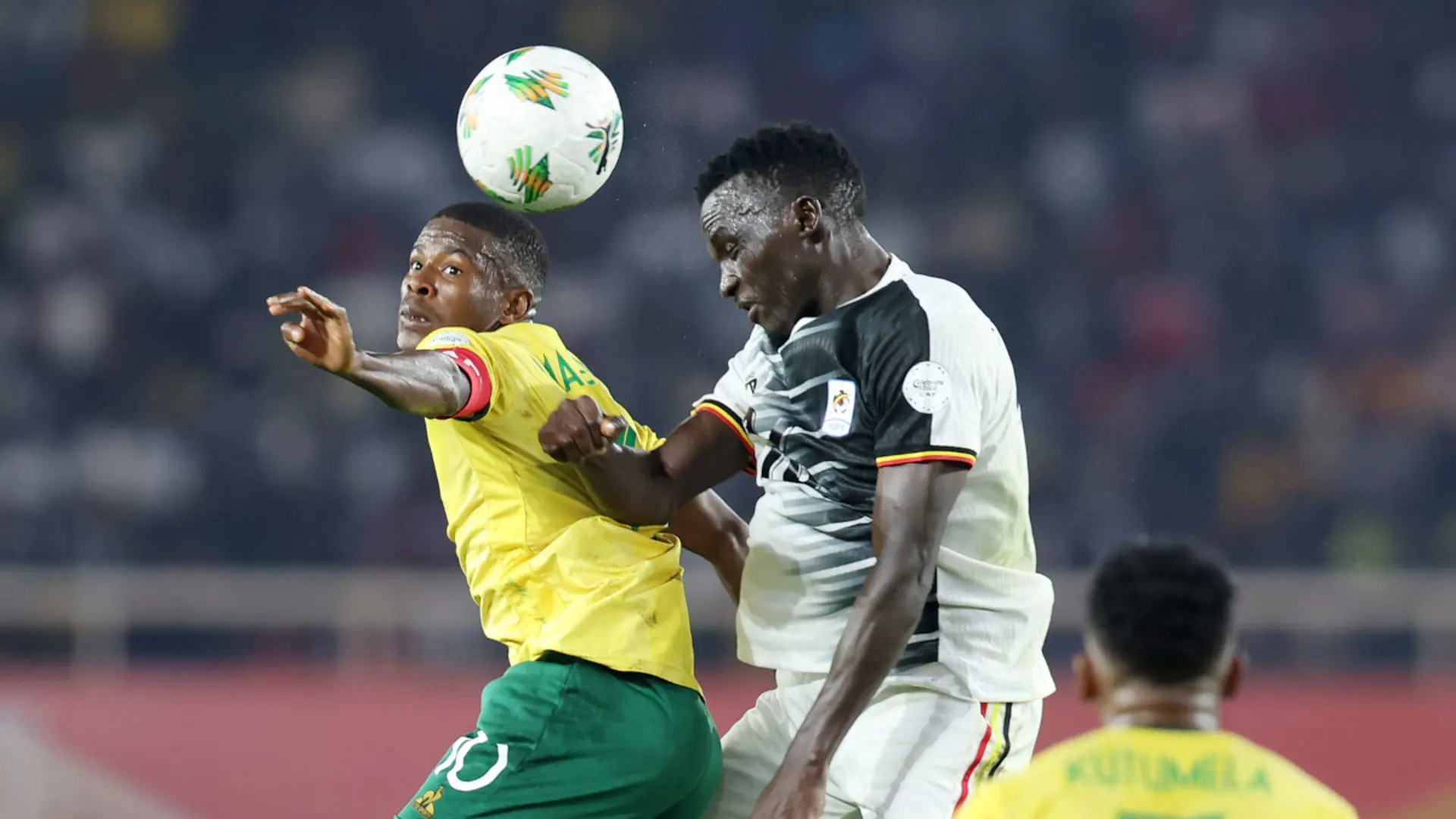Bafana Bafana at CHAN 2025 ended with a sting that will linger in South African football memories, a 3-3 draw with Uganda in Kampala that felt like defeat after two stoppage-time penalties flipped the script and sealed an exit on goal difference. Days earlier, a goalless stalemate with Niger had kept Group C balanced on a knife edge, then Monday night at the Mandela National Stadium tilted it in the hosts’ favor amid deafening noise and high drama. This was tournament football in its rawest form, decided by inches, interventions and nerve.
The night that slipped away
The game grew slowly into life, with South Africa shading possession but creating little before the 14th minute warning when Uganda left-back Herbert Achayi rattled the upright to stir the home crowd. The Cranes seized their moment just after the half-hour when Jude Ssemugabi finished a swift counter, a goal born from transition and precision that left Bafana chasing at the break. The stage, the pressure and the tempo were all rising inside the Mandela National Stadium.
Molefi Ntseki’s team found a surge after halftime and it felt transformative. Ramahlwe Mphahlele bundled home in the 52nd minute from a loose ball after a right-sided free kick, the decision standing after a VAR check that proved pivotal to the momentum swing. Six minutes later, Thabiso Kutumela made space from a well-weighted throw-in and slid in a tight-angled finish, a reminder that South Africa’s set pieces were indeed their bread and butter.
As the clock moved into the closing stretch, Ndabayithethwa Ndlondlo delivered a moment of cool audacity, lifting a classy lob in the 83rd minute to make it 3-1 and send the South African bench into a brief release of celebration. That strike capped a rapid counter and seemed to usher in a safe landing, a place in the last eight almost within touch. Then the match turned on penalties, pressure and the relentlessness of hosts who refused to fold under the lights, a sequence that would define Group C.
First came Allan Okello’s 88th-minute spot kick, awarded after a high boot by Keagan Johannes, that sliced the deficit to 3-2 and revived the stadium’s belief. Then, deep into stoppage time, a Ugandan shot struck Menzi Masuku on the arm, prompting a long consultation with VAR and a pitch-side monitor check before the referee pointed to the spot once more. Rogers Torach stepped up, kept his composure and made it 3-3 in the 96th minute, the equaliser that launched wild celebrations and pushed Uganda through as group winners with seven points, while South Africa would finish on six and bow out on goal difference.
VAR at the heart of the story
The cameras and screens shaped the narrative of this campaign, not only in Kampala on Monday but also earlier in the week. Against Niger, South Africa were denied twice in the first half when two penalty awards were overturned after lengthy reviews, a sequence that set a tone of frustration at a time when every decision carried enormous weight. The cold certainty of technology intersected with raw emotion, and the margins clipped Bafana Bafana by the narrowest of calls.
In the Uganda match, VAR checked Mphahlele’s equaliser and the goal stood, a rare instance where the review confirmed South Africa’s momentum. Yet stoppage time brought a different outcome as the handball review inside the Bafana box led to the decisive penalty that Torach converted. In a tournament defined by fine details, VAR’s presence felt constant, a hovering influence that demanded emotional control and tactical discipline in the most pressurised moments.
The fine margins that shaped Group C
Friday’s draw with Niger had left the section delicately poised. Uganda sat on six points after sitting out that round, while Algeria and South Africa were level on five points, leaving Niger with a slim mathematical hope and a chance to play spoiler. The scenario produced a dramatic final day, with South Africa facing a must-win against the hosts and Algeria needing only a point against Niger to be safe, a blended mix of jeopardy and opportunity that poured intensity into every minute.
By the end of Monday night, the picture was brutal and clear. Uganda topped the group with seven, Algeria and South Africa finished on six, and Bafana’s adventure ended on the thinnest separator. The lesson is as old as tournament football itself, that control of a game and even a two-goal cushion can still be undone if the final passages are not managed with absolute precision, a message that will resonate with Molefi Ntseki and his players long after the noise fades.
A foundation of set pieces and counters
South Africa’s second half in Kampala showcased a clear pathway to destabilising the hosts. The equaliser arrived from a right-sided free kick that produced chaos in the box, then Kutumela’s strike came from a throw-in that caught the defence off balance, tangible evidence that Bafana’s rehearsed routines were landing at the right time. The third, Ndlondlo’s inventive lob, stemmed from a lightning counter that exploited space and nerve, a sequence that showed both awareness and technical calm.
For long stretches, especially against Niger, South Africa’s control of possession was evident. Ntseki’s men recorded 62 percent of the ball, completed more than 430 passes and fashioned five efforts on target to Niger’s two, a statistical profile of authority that lacked the final incision. In the end, the inability to convert dominance into a decisive margin left the door ajar, and in Group C that sliver was enough to change the course of an entire campaign.
Key turning points
- Two VAR-overturned penalties against Niger in the first half,
- Ndlondlo’s 83rd-minute lob to make it 3-1 against Uganda,
- The stoppage-time handball review and Rogers Torach’s equalising penalty.
Voices from the camp
After the goalless draw with Niger, there was measured calm. Ntseki summed up the mood with a reminder to stay the course.
“I think that South Africa did their best in trying to win this game. But it was not meant to be, and we move forward.”
Captain Ramahlwe Mphahlele echoed the resilience with a promise that the draw “keeps our hopes intact”, while acknowledging the need for sharper finishing in the final third, a theme that threaded into the decisive clash with Uganda.
Inside the 3-3 epic in Kampala
Match flow matters, and this one pulsed with shifts that told a story of psychology as much as tactics. Uganda’s early warning from Achayi’s strike against the upright and Ssemugabi’s counter-attacking finish set a tone of menace from wide and in transition, a pattern the hosts rode for belief. South Africa answered with set pieces and pressure, Mphahlele’s scrappy leveller and Kutumela’s angled finish turning the tide before Ndlondlo’s impudent chip seemed to end the argument, a microcosm of confidence built one action at a time.
Then came the squeeze of closing time. Okello’s penalty narrowed the gap and unlocked the stadium’s roar, a powerful force in the final minutes as South Africa sought to manage territory and tempo. The last act, a shot striking Masuku’s arm and a long check at the monitor, brought a collective pause before Torach’s conversion completed the twist, a sequence that left Bafana aghast and the Cranes carried by a 34,000-strong crowd.
The teams on the night
South Africa’s starting unit featured Xulu, Mphahlele, Johannes, Mngonyama, Jooste, Ndlondlo, Khoza, Mashego, Maema, Dolly and Kutumela. Substitutions included Majadibodou for Mphahlele on 79 minutes, Makarine and Masuku for Ndlondlo and Dolly in the closing minutes, with Tlolane introduced in added time, a series of changes aimed at shoring up shape and managing the final moments.
Uganda lined up with Mutakubwa, Achayi, Mukudane, Torach, Kizito, Watambala, Ssebagala, Mpande, Kakande, Okello and Ssemugabi, then injected fresh legs through Ahimbisibwe, Sentamu and Usama. The spine of the side held firm in the rush, while Okello’s calm from the spot and Torach’s authority in the 96th minute wrote the final chapter for the hosts and the group.
What it means for Uganda and South Africa
Uganda made history by reaching the quarter-finals for the first time in CHAN, powered by creative sparks from Allan Okello and a never-say-die spirit that carried them across the line. There is a broader significance in the composure displayed under pressure, especially in the dying minutes when decisions and execution matter most, a template the hosts can carry into the last eight with confidence and belief.
For Bafana, there are bruises and there are building blocks. The Kampala performance showcased courage, attacking quality and a set-piece edge that can trouble anyone, yet it also underlined the imperative to close out matches and to bring clinical clarity to the final passes and choices. The margins at this level are unforgiving, and finishing on six points without progression is a harsh tutor that will inform the next steps for this group of players and coaches.
Lessons to carry forward
Three themes emerge from this campaign. First, South Africa’s identity with the ball was strong, and the numbers from the Niger draw confirmed a team comfortable controlling rhythm and territory, even against well-organised blocks. Second, set-piece variety created real chances, from a scrambled equaliser to a crafted throw-in move and a counter-finished chip, a foundation worth nurturing in preparation and selection. Third, game management in the final ten minutes becomes an obsession at tournament level, since the pressure of moments can rewrite an entire week of work, a truth South Africa felt most acutely in Kampala.
There is also the human texture that sits beneath the tactics and stats. Players like Mphahlele, Kutumela and Ndlondlo delivered when the lights were brightest, courage that deserves recognition even in defeat. For Ntseki, the balance between patience and punch in the final third will remain a focal point, just as the use of the bench and the protect-and-push choices in closing sequences invite thoughtful review.
A campaign that still mattered
It is easy to reduce a tournament to an exit line, yet this CHAN journey held moments that will shape careers. From the sharpness of the second-half surge against Uganda to the poise required during VAR-heavy passages against Niger, South Africa showed a team absorbing pressure, learning in real time and refusing to back down. The table may offer a cold verdict, but the experience itself carries heat, a reminder that progress can be buried inside tough endings and tight finishes.
As Uganda look ahead with momentum and belief, South Africa will look inward, not for blame, but for the details that shift outcomes, those small pieces of timing and control that swing a quarter-final place by one more choreographed set piece or one clearer decision on the edge of the box. Football does not always reward the better spell, it rewards the better moment, and in Kampala those moments belonged to the hosts when it mattered most.
Final word
There was drama, there was noise, and there was heartbreak. For South Africa, the 3-3 draw that felt like a loss will sit alongside a goalless draw that felt like a missed opportunity, a pairing that ultimately framed their Group C story. For Uganda, history, a place in the quarter-finals and a celebration to match any night in their footballing memory, a reminder of why we watch, why we invest, and why the game can still surprise, even when a team leads by two with minutes to play.






